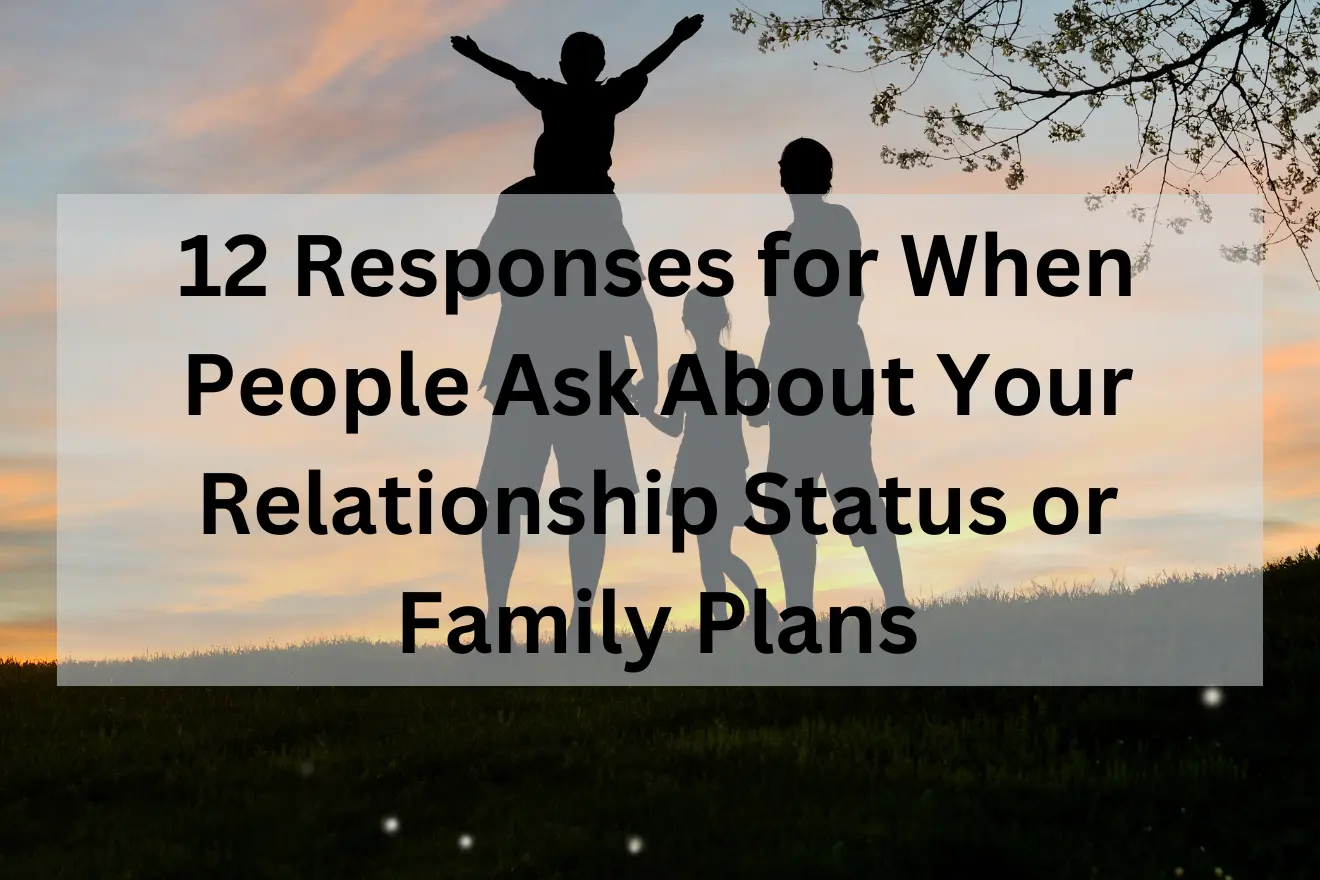We’ve all been there. You’re at a family gathering or catching up with friends, and someone asks that ever-persistent question: “So, when are you getting married?” or “When are you having a baby?” Whether you’re single, in a relationship, married without kids, or simply not ready, these questions can sometimes feel intrusive or pressure-filled. But worry not! Here are 12 responses you can give when faced with these personal inquiries.
1. The Light-hearted Deflection
Sometimes, a little humor goes a long way.
Example:
“Oh, you know, just waiting for the right time! Maybe after I’ve conquered the world first.”
Humor can lighten the mood and gently shift the conversation away from the topic.
2. The Honest Truth
Honesty is often the best policy. If you’re comfortable, sharing your genuine feelings can foster understanding.
Example:
“Honestly, we’re just focusing on our careers right now.”
This response is straightforward and can help clarify your priorities without delving too deeply into personal territory.
3. The Future Plan
If you do have a timeline in mind, sharing it can be a good way to address the question.
Example:
“We’re thinking maybe in a couple of years, once we’re more settled.”
This lets the person know that it’s on your radar, just not immediate.
4. The Polite Rebuttal
For those who prefer to keep things private, a polite yet firm response can work wonders.
Example:
“That’s a pretty personal question. We’re happy where we are right now.”
This sets a boundary without being rude.
5. The Playful Mystery
Keeping a bit of mystery can add a fun twist to your response.
Example:
“Well, that’s a secret only time will tell!”
This playful answer can satisfy curiosity without revealing too much.
6. The Shift to Positives
Highlighting the positives in your current situation can steer the conversation in a different direction.
Example:
“We’re really enjoying traveling and exploring the world together at the moment.”
This shows that you’re content with your life as it is.
7. The Learning Curve
If you’re not sure about the timing, acknowledging that can be a good approach.
Example:
“We’re still figuring things out and enjoying learning more about each other.”
This indicates that you’re on a journey and taking your time.
8. The Cultural Context
Sometimes, cultural or familial expectations play a role. Explaining this can add context.
Example:
“In our culture, we usually take some time before jumping into big commitments.”
This can help others understand that there are broader considerations at play.
9. The Simple Deflection
A straightforward deflection can be effective without causing offense.
Example:
“Oh, I’m not sure yet. How about you? Any big plans?”
Turning the question back on the asker can smoothly redirect the conversation.
10. The Gratitude Approach
Expressing gratitude for their interest while setting a boundary can be a gentle way to handle the question.
Example:
“Thanks for your concern! We’re just taking things one step at a time right now.”
This response acknowledges their curiosity while maintaining your privacy.
11. The Lighthearted Avoidance
Sometimes, keeping things light and avoiding the question works best.
Example:
“I’ve heard planning these things can be as tricky as rocket science!”
This light-hearted response can deflect the question with a touch of humor.
12. The Open Conversation
If you’re open to discussing it, a more in-depth conversation can be meaningful.
Example:
“We’ve been talking about it a lot recently, trying to figure out what’s best for us.”
This can lead to a deeper, more supportive discussion.
Why These Responses Work
Navigating personal questions about marriage and children can be challenging. These responses are designed to:
- Respect Boundaries: They help you maintain your privacy and set boundaries.
- Foster Understanding: Honest and context-filled responses can foster understanding and empathy.
- Diffuse Pressure: Light-hearted and humorous answers can diffuse the pressure of the question.
- Redirect Conversation: Some responses effectively steer the conversation in a different direction.
Tips for Handling These Questions
- Know Your Comfort Level: Understand what you’re comfortable sharing and what you’re not.
- Stay Calm: It’s easy to feel pressured, but staying calm helps you handle the situation gracefully.
- Have Responses Ready: Having a few go-to responses can make these moments easier.
- Be Respectful: Remember, most people ask out of genuine curiosity or concern. Responding respectfully maintains positive interactions.
When the Questions Keep Coming
Sometimes, despite your best efforts, people might persist. Here are additional strategies for when the questions just won’t stop:
- Firm Boundaries: If the questions become too intrusive, setting firmer boundaries might be necessary. You can say something like, “I appreciate your interest, but I’d rather keep that private.”
- Involve Your Partner: If you’re in a relationship, involving your partner in the conversation can help. You can say, “We’re discussing it together and will decide what’s best for us.”
- Change the Topic: Skillfully changing the topic can help. For example, “That’s a good question! Speaking of plans, have you heard about the new restaurant that opened downtown?”
Dealing with Family Expectations
Family expectations can add an extra layer of complexity to these questions. Here’s how to manage them:
- Communicate Openly: Have open conversations with family members about your plans and feelings. This can help manage their expectations.
- Seek Support: Find a supportive family member who understands your perspective and can help communicate it to others.
- Stay True to Yourself: Ultimately, the decisions about your life should be yours. Staying true to yourself and your values is essential.
Conclusion
Questions about marriage and children are common and often come from a place of love and curiosity. However, they can sometimes feel invasive or pressure-filled. By having a range of responses ready—from light-hearted and humorous to honest and firm—you can handle these questions with grace and confidence. Remember to set boundaries where needed, communicate openly with those who matter, and stay true to your own timeline and decisions.
Life is a journey with its own unique path, and only you can decide what’s best for you. So, the next time someone asks, “When are you getting married?” or “When are you having a baby?” you’ll be prepared to respond in a way that feels right for you.



